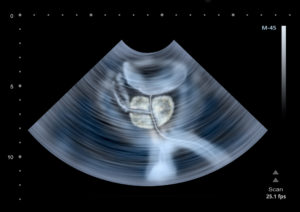Prostate Overview
The prostate gland is unique to men, and is located below the bladder and in front of the rectum. The prostate gland wraps around the urethra, which is the drainage tube for the bladder. Because of its location, the prostate has a pronounced effect on how well the bladder empties. As men age, their prostate naturally enlarges. An overabundance of prostate tissue can squeeze or block the urethra causing problems with urine flow.
This gland functions to secrete seminal fluid, which is necessary for reproduction. During sexual climax, muscles in and around the gland contracts to allow seminal fluid to leave the prostate. This fluid helps to transport sperm.
Certain parts of the brain control the valvular function of the prostate: when it should open, close, when the muscles should relax, and when they should contract. Hormones released from different parts of the body can make the prostate enlarge, or cause its muscles to contract or relax.
The prostate
There are several urologic conditions that affect the prostate gland, so it is important for men to monitor their prostate health. A prostate examination will consist of a digital rectal exam and PSA blood testing. It is generally recommended that men begin regular prostate testing by the age of 50. For African-American men and men who have a history of prostate cancer in their families, the recommended age of testing begins around 40.
Prostate conditions include:
Prostatitis – Inflammation of the prostate
Benign Prostatic Hyperplasia (BPH) – An enlarged prostate -this is not a cancerous condition, nor will it lead to cancer
Typical symptoms related to an enlarged prostate include:
- Decreased force of urinary stream
- Frequent urination,
- Having to get up at night to urinate (nocturia)
- Dribbling urine after the bladder is emptied
- Inability to urinate – severe cases
Current statistics suggest that one in seven men will develop prostate cancer during their lifetime. This cancer rarely causes symptoms in its early stages. Symptoms such as difficulty urinating, bone pain or weight loss, can signal advanced cancer.
If it is time for your prostate screening, contact the Urology Austin office nearest you to schedule an appointment.

